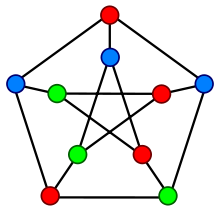Backtracking is an algorithmic paradigm that tries different solutions until finds a solution that “works”. Problems which are typically solved using backtracking method have a property in common: These problems can only be solved by trying every possible configuration and each configuration is tried only once.
The M Coloring problem is an example of such problem.
The problem statement is a follow:
Given an undirected graph and a number m, determine if the graph can be colored with at most m colors such that no two adjacent vertices of the graph are colored with same color. Here coloring of a graph means assignment of colors to all vertices.
1) A 2D array graph[V][V] where V is the number of vertices in graph and graph[V][V] is adjacency matrix representation of the graph. A value graph[i][j] is 1 if there is a direct edge from i to j, otherwise graph[i][j] is 0.
2) An integer m which is maximum number of colors that can be used.
Output: An array color[V] that should have numbers from 1 to m. color[i] should represent the color assigned to the ith vertex. The code should also return false if the graph cannot be colored with m colors.

Algorithm:
If all colors are assigned,
print vertex assigned colors
Else
a. Trying all possible colors, assign a color to the vertex
b. If color assignment is possible, recursivelty assign colors to next vertices
c. If color assignment is not possible, de-assign color, return False
Code:
def is_safe(n, graph, colors, c):
# Iterate trough adjacent vertices
# and check if the vertex color is different from c
for i in xrange(n):
if graph[n][i] and c == colors[i]: return False
return True
# n = vertex nb
def graphColoringUtil(graph, color_nb, colors, n):
# Check if all vertices are assigned a color
if color_nb+1 == n :
return True
# Trying differents color for the vertex n
for c in xrange(1, color_nb+1):
# Check if assignment of color c to n is possible
if is_safe(n, graph, colors, c):
# Assign color c to n
colors[n] = c
# Recursively assign colors to the rest of the vertices
if graphColoringUtil(graph, color_nb, colors, n+1): return True
# If there is no solution, remove color (BACKTRACK)
colors[n] = 0
We test the algorithm for the following graph and test whether it is 3 colorable:
(3)---(2)
| / |
| / |
| / |
(0)---(1)
#nb of vertex
vertex_nb = 4
# nb of colors
color_nb = 3
# Initiate vertex colors
colors = [0] * vertex_nb
graph = [
[0, 1, 1, 1],
[1, 0, 1, 0],
[1, 1, 0, 1],
[1, 0, 1, 0],
]
#beginning with vertex 0
if graphColoringUtil(graph, color_nb, colors, 0):
print colors
else:
print "No solutions"
[1, 2, 3, 2]
The solution corresponds to the following assignments:
1st node : color 1
2nd node : color 2
3rd node : color 3
References:
http://www.geeksforgeeks.org/backttracking-set-5-m-coloring-problem/